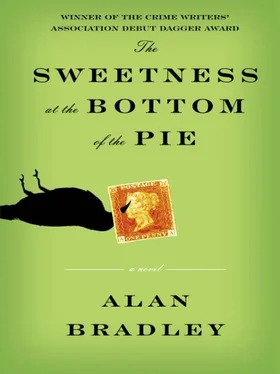Alan Bradley - The Sweetness at the Bottom of the Pie
Здесь есть возможность читать онлайн «Alan Bradley - The Sweetness at the Bottom of the Pie» весь текст электронной книги совершенно бесплатно (целиком полную версию без сокращений). В некоторых случаях можно слушать аудио, скачать через торрент в формате fb2 и присутствует краткое содержание. Жанр: Старинная литература, на английском языке. Описание произведения, (предисловие) а так же отзывы посетителей доступны на портале библиотеки ЛибКат.
- Название:The Sweetness at the Bottom of the Pie
- Автор:
- Жанр:
- Год:неизвестен
- ISBN:нет данных
- Рейтинг книги:3 / 5. Голосов: 1
-
Избранное:Добавить в избранное
- Отзывы:
-
Ваша оценка:
- 60
- 1
- 2
- 3
- 4
- 5
The Sweetness at the Bottom of the Pie: краткое содержание, описание и аннотация
Предлагаем к чтению аннотацию, описание, краткое содержание или предисловие (зависит от того, что написал сам автор книги «The Sweetness at the Bottom of the Pie»). Если вы не нашли необходимую информацию о книге — напишите в комментариях, мы постараемся отыскать её.
The Sweetness at the Bottom of the Pie — читать онлайн бесплатно полную книгу (весь текст) целиком
Ниже представлен текст книги, разбитый по страницам. Система сохранения места последней прочитанной страницы, позволяет с удобством читать онлайн бесплатно книгу «The Sweetness at the Bottom of the Pie», без необходимости каждый раз заново искать на чём Вы остановились. Поставьте закладку, и сможете в любой момент перейти на страницу, на которой закончили чтение.
Интервал:
Закладка:
But before I could think of a suitable response, Father was behind me.
"Flavia, a word." His voice was as heavy as the lead weights on a deep-sea diver's boots.
I glanced at Mrs. Mullet to see how she was taking it. She always fled at the slightest whiff of unpleasantness, and once when Father raised his voice, she had rolled herself up in a carpet and refused to come out until her husband was sent for.
She eased the oven door shut as if it were made of Waterford crystal.
"I must be off," she said. "Lunch is in the warming oven."
"Thank you, Mrs. Mullet," Father said. "We'll manage." We were always managing.
She opened the kitchen door—and let out a sudden shriek like a cornered badger. “Oh, good Lord! Beggin' your pardon, Colonel de Luce, but, oh, good Lord!”
Father and I had to push a bit to see round her.
It was a bird, a jack snipe—and it was dead. It lay on its back on the doorstep, its stiff wings extended like a little pterodactyl, its eyes rather unpleasantly filmed over, the long black needle of its bill pointing straight up into the air. Something impaled upon it shifted in the morning breeze—a tiny scrap of paper.
No, not a scrap of paper, a postage stamp.
Father bent down for a closer look, then gave a little gasp. And suddenly he was clutching at his throat, his hands shaking like aspen leaves in autumn, his face the color of sodden ashes.
2
MY SPINE, AS THEY SAY, TURNED TO ICE. FOR A MOMENT I thought he was having a heart attack, as sedentary fathers often do. One minute they are crowing at you to chew every mouthful twenty-nine times and the next you are reading about them in The Daily Telegraph:
Calderwood, Jabez, of The Parsonage, Frinton. Suddenly at his residence on Saturday, the 14th inst. In his fifty-second year. Eldest son of et cetera… et cetera… et cetera… survived by daughters, Anna, Diana, and Trianna…
CALDERWOOD, JABEZ, AND HIS ILK had the habit of popping off to heaven like jacks-in-the-box, leaving behind, to fend for themselves, an assortment of dismal-sounding daughters.
Hadn't I already lost one parent? Surely Father wouldn't pull such a rotten trick.
Or would he?
No. He was now sucking air noisily up through his nose like a cart horse as he reached out towards the thing on the doorstep. His fingers, like long, unsteady white tweezers, deskewered the stamp delicately from the dead bird's bill, and then shoved the punctured scrap hastily into one of his waistcoat pockets. He pointed a trembling forefinger at the little carcass.
"Dispose of that thing, Mrs. Mullet," he said in a strangled voice that sounded like someone else's: the voice of a stranger.
"Oh my, Colonel de Luce," Mrs. Mullet said. "Oh my, Colonel, I don't. I think. I mean to say."
But he was already gone, to his study, stumping off, huffing and puffing like a freight engine.
As Mrs. M went, hand over mouth, for the dustpan, I escaped to my bedroom.
THE BEDROOMS AT BUCKSHAW WERE VAST, dim Zeppelin hangars, and mine, in the south—or Tar—wing, as we called it, was the largest of the lot. Its early-Victorian wallpaper (mustard yellow, with a spattering of things that looked like bloodred clots of string) made it seem even larger: a cold, boundless, drafty waste. Even in summer the trek across the room to the distant washstand near the window was an experience that might have daunted Scott of the Antarctic; just one of the reasons I skipped it and climbed straight up into my four-poster bed where, wrapped in a woolen blanket, I could sit cross-legged until the cows came home, pondering my life.
I thought, for instance, of the time I used a butter knife to scrape off samples of my jaundiced wall covering. I remembered Daffy's wide-eyed recounting of one of A. J. Cronin's books in which some poor sod sickened and died after sleeping in a room in which one of the wallpaper's prime coloring ingredients was arsenic. Filled with hope, I carried my scrapings up to the laboratory for analysis.
No stodgy old Marsh's test for me, thank you very much! I favored the method by which the arsenic was first converted to its trioxidic, then heated with sodium acetate to produce cacodyl oxide: not only one of the most poisonous substances ever known to exist on this planet Earth, but one with the added advantage of giving off a most unbelievably offensive odor: like the stink of rotten garlic, but a million times worse. Its discoverer, Bunsen (of burner fame), noted that just one whiff of the stuff would not only make your hands and feet tingle, but also your tongue would develop a vile black coating. Oh, Lord, how manifold are thy works!
You can imagine my disappointment when I saw that my sample contained no arsenic: It had been colored by a simple organic tincture, most likely one made from the common goat-willow (Salix caprea) or some other harmless and supremely boring vegetable dye.
Somehow that caused my thoughts to go flying back to Father.
What had frightened him so at the kitchen door? And was it really fear I had seen in his face?
Yes, there seemed little doubt of that. There was nothing else it could have been. I was already far too familiar with his anger, his impatience, his fatigue, his sudden bleak moods: all of them states which drifted now and then across his face like the shadows of the clouds that moved across our English hills.
He was not afraid of dead birds, that much I knew. I had seen him tuck into many a fat Christmas goose, brandishing his knife and fork like an Oriental assassin. Surely it couldn't be the presence of feathers? Or the bird's dead eye?
And it couldn't have been the stamp. Father loved stamps more dearly than he loved his offspring. The only thing he had ever loved more than his pretty bits of paper was Harriet. And she, as I have said, was dead.
Like that snipe.
Could that be the reason for his reaction?
"No! No! Get away!" The harsh voice came in at my open window, derailing and wrecking my train of thought.
I threw off the blanket, leaped from my bed, ran across the room, and looked down into the kitchen garden.
It was Dogger. He was flattened against the garden wall, his dark, weathered fingers splayed out across the faded red bricks.
"Don't come near me! Get away!"
Dogger was Father's man: his factotum. And he was alone in the garden.
It was whispered—by Mrs. Mullet, I might as well admit—that Dogger had survived two years in a Japanese prisoner-of-war camp, followed by thirteen more months of torture, starvation, malnutrition, and forced labor on the Death Railway between Thailand and Burma where, it was thought, he had been forced to eat rats.
"Go gently, dear," she told me. "His nerves are something shocking."
I looked down at him there in the cucumber patch, his thatch of prematurely white hair standing on end; his eyes upturned, seemingly sightless, to the sun.
"It's all right, Dogger!" I shouted. "I've got them covered from up here."
For a moment, I thought he hadn't heard me, but then his face turned slowly, like a sunflower, towards the sound of my voice. I held my breath. You never know what someone might do in such a state.
"Steady on, Dogger," I called out. "It's all right. They've gone."
Suddenly he went limp, like a man who has been holding a live electrical wire in which the current has just been switched off.
"Miss Flavia?" His voice quavered. "Is that you, Miss Flavia?"
"I'm coming down," I said. "I'll be there in a jiff."
Down the back stairs I ran, pell-mell, and into the kitchen. Mrs. Mullet had gone home, but her custard pie sat cooling at the open window.
No, I thought: What Dogger needed was something to drink. Father kept his Scotch locked tightly in a bookcase in his study, and I could not intrude.
Читать дальшеИнтервал:
Закладка:
Похожие книги на «The Sweetness at the Bottom of the Pie»
Представляем Вашему вниманию похожие книги на «The Sweetness at the Bottom of the Pie» списком для выбора. Мы отобрали схожую по названию и смыслу литературу в надежде предоставить читателям больше вариантов отыскать новые, интересные, ещё непрочитанные произведения.
Обсуждение, отзывы о книге «The Sweetness at the Bottom of the Pie» и просто собственные мнения читателей. Оставьте ваши комментарии, напишите, что Вы думаете о произведении, его смысле или главных героях. Укажите что конкретно понравилось, а что нет, и почему Вы так считаете.












